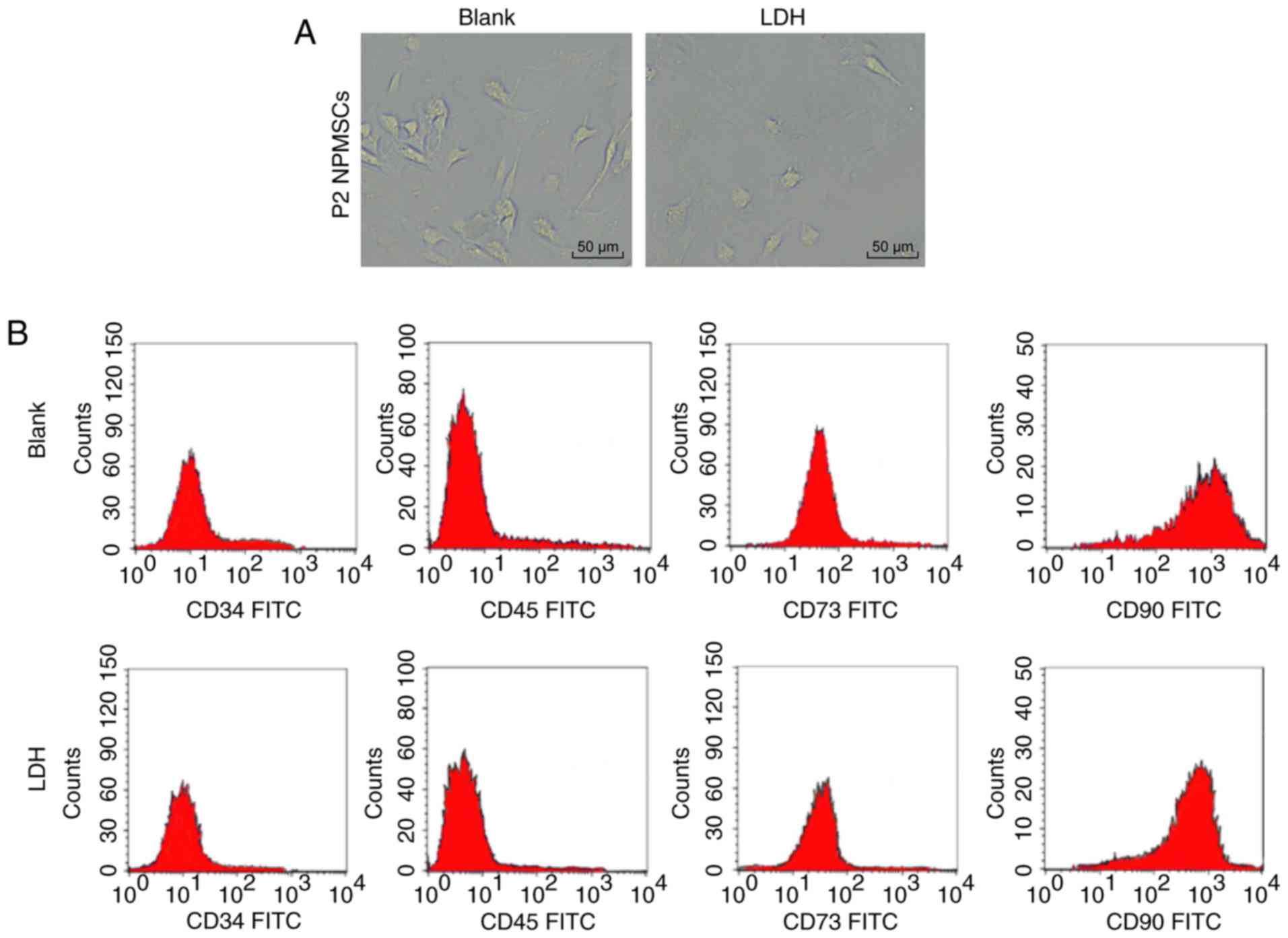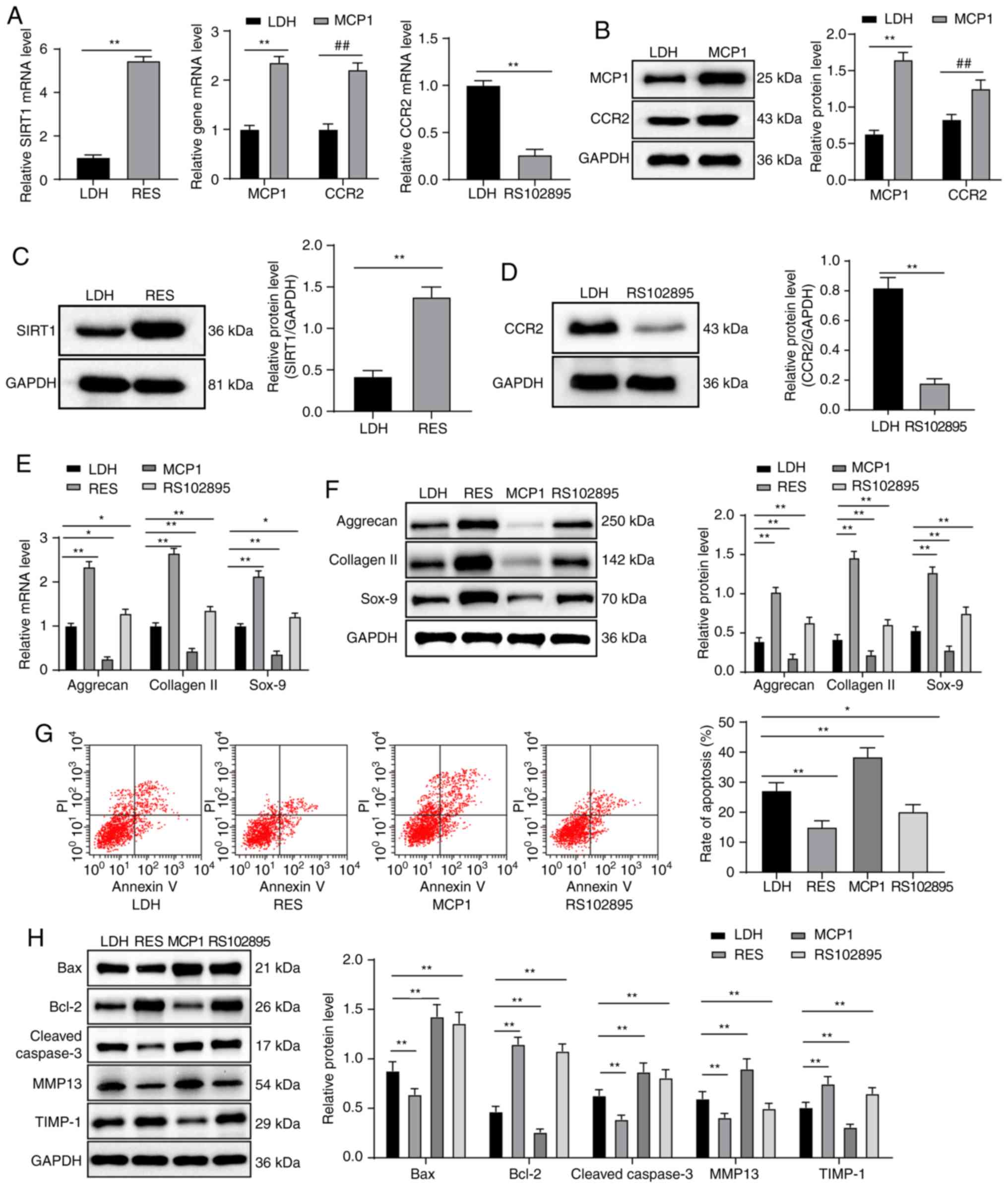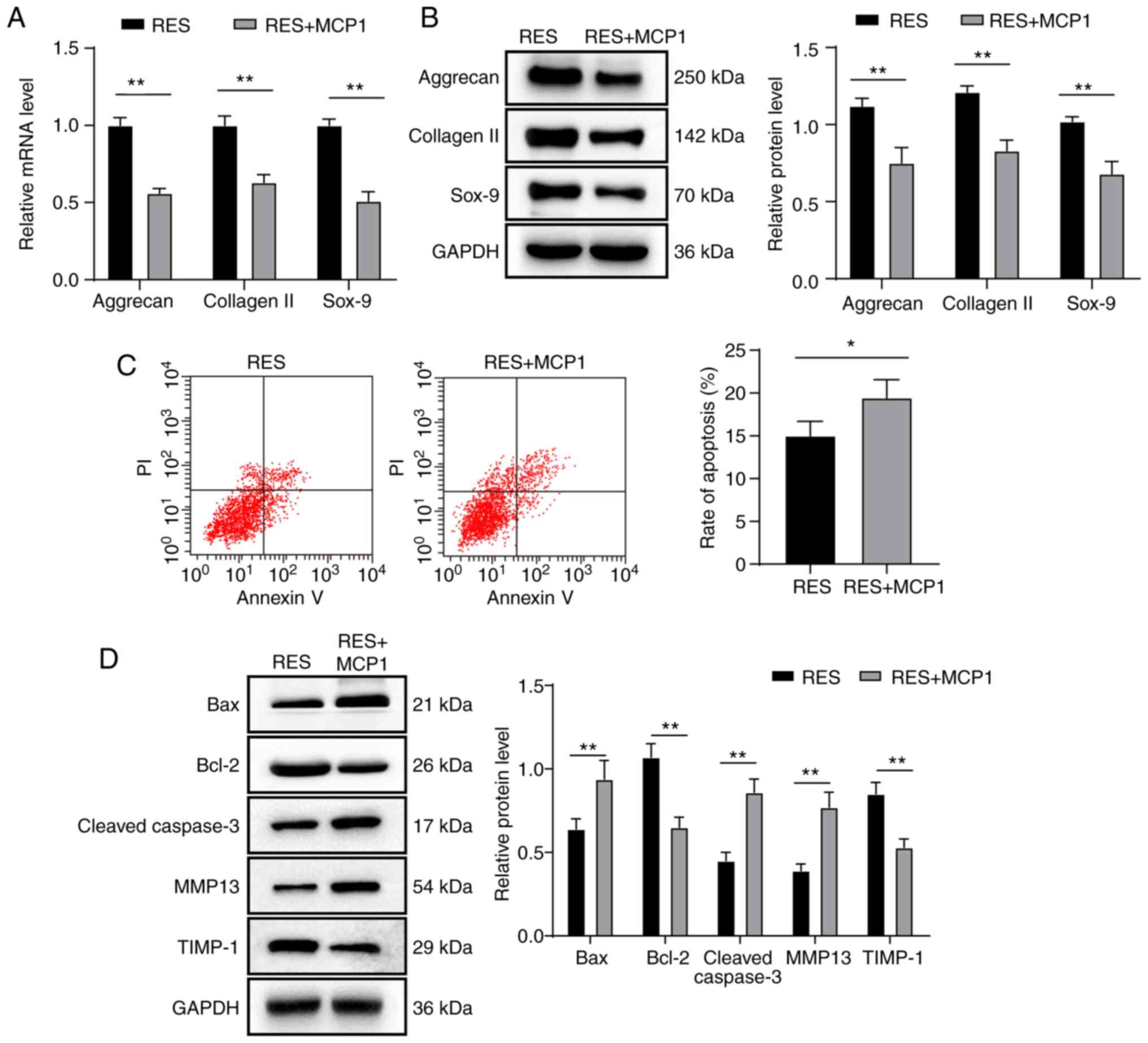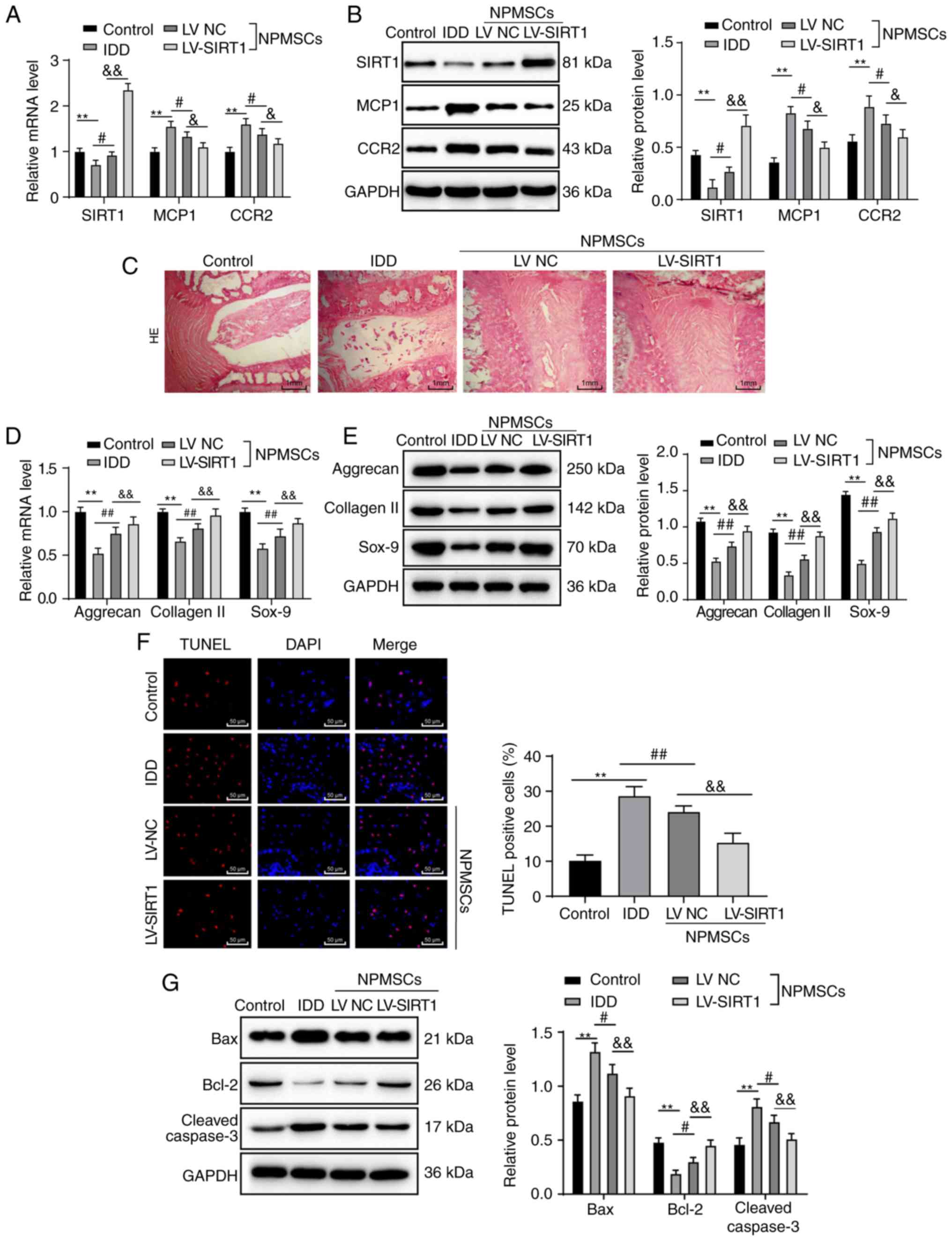|
1
|
Loibl M, Wuertz-Kozak K, Vadala G, Lang S,
Fairbank J and Urban JP: Controversies in regenerative medicine:
Should inter-vertebral disc degeneration be treated with
mesenchymal stem cells? JOR Spine. 2:e10432019. View Article : Google Scholar
|
|
2
|
Kaiser J, Allaire B, Fein PM, Lu D,
Jarraya M, Guermazi A, Demissie S, Samelson EJ, Bouxsein ML and
Morgan EF: Correspondence between bone mineral density and
intervertebral disc degeneration across age and sex. Arch
Osteoporos. 13:1232018. View Article : Google Scholar : PubMed/NCBI
|
|
3
|
Li XC, Wang MS, Liu W, Zhong CF, Deng GB,
Luo SJ and Huang CM: Co-culturing nucleus pulposus mesenchymal stem
cells with notochordal cell-rich nucleus pulposus explants
attenuates tumor necrosis factor-α-induced senescence. Stem Cell
Res Ther. 9:1712018. View Article : Google Scholar
|
|
4
|
Li H, Wang J, Li F, Chen G and Chen Q: The
influence of hyper-osmolarity in the intervertebral disc on the
proliferation and chondrogenic differentiation of nucleus
pulposus-derived mesenchymal stem cells. Cells Tissues Organs.
205:178–188. 2018. View Article : Google Scholar
|
|
5
|
Chen S, Zhao L, Deng X, Shi D, Wu F, Liang
H, Huang D and Shao Z: Mesenchymal stem cells protect nucleus
pulposus cells from compression-induced apoptosis by inhibiting the
mitochondrial pathway. Stem Cells Int. 2017:98431202017. View Article : Google Scholar
|
|
6
|
Mohanty S and Dahia CL: Defects in
intervertebral disc and spine during development, degeneration, and
pain: New research directions for disc regeneration and therapy
Wiley. Interdiscip Rev Dev Biol. 8:e3432019. View Article : Google Scholar
|
|
7
|
Jezierska-Wozniak K, Barczewska M, Habich
A, Wojtacha P, Badowska W, Maksymowicz W and Wojtkiewicz J: The
feasibility of the CD271+ and CD271-mesenchymal stromal cell
enrichment toward nucleus pulposus-like cells. Folia Histochem
Cytobiol. 55:114–123. 2017. View Article : Google Scholar
|
|
8
|
Lee SH, Lee JH, Lee HY and Min KJ: Sirtuin
signaling in cellular senescence and aging. BMB Rep. 52:24–34.
2019. View Article : Google Scholar :
|
|
9
|
Bradley EW, Carpio LR, van Wijnen AJ,
McGee-Lawrence ME and Westendorf JJ: Histone deacetylases in bone
development and skeletal disorders. Physiol Rev. 95:1359–1381.
2015. View Article : Google Scholar : PubMed/NCBI
|
|
10
|
Almeida M and Porter RM: Sirtuins and
FoxOs in osteoporosis and osteoarthritis. Bone. 121:284–292. 2019.
View Article : Google Scholar : PubMed/NCBI
|
|
11
|
Sun W, Qiao W, Zhou B, Hu Z, Yan Q, Wu J,
Wang R, Zhang Q and Miao D: Overexpression of Sirt1 in mesenchymal
stem cells protects against bone loss in mice by FOXO3a
deacetylation and oxidative stress inhibition. Metabolism.
88:61–71. 2018. View Article : Google Scholar : PubMed/NCBI
|
|
12
|
Wang Y, Ni H, Li H, Deng H, Xu LS, Xu S,
Zhen Y, Shen H, Pan H and Yao M: Nuclear factor kappa B regulated
monocyte chemoattractant protein-1/chemokine CC motif receptor-2
expressing in spinal cord contributes to the maintenance of
cancer-induced bone pain in rats. Mol Pain.
14:17448069187886812018. View Article : Google Scholar : PubMed/NCBI
|
|
13
|
Faienza MF, D'Amato G, Chiarito M,
Colaianni G, Colucci S, Grano M, Corbo F and Brunetti G: Mechanisms
involved in childhood obesity-related bone fragility. Front
Endocrinol (Lausanne). 10:2692019. View Article : Google Scholar
|
|
14
|
Xie Z, Wang P, Li J, Li Y, Wang S, Wu X,
Sun S, Cen S, Su H, Deng W, et al: MCP1 triggers monocyte
dysfunctions during abnormal osteogenic differentiation of
mesenchymal stem cells in ankylosing spondylitis. J Mol Med (Berl).
95:143–154. 2017. View Article : Google Scholar
|
|
15
|
Arkestal K, Mints M, Enocson A, Linton L,
Marits P, Glise H, Andersson J and Winqvist O: CCR2 upregulated on
peripheral T cells in osteoarthritis but not in bone marrow. Scand
J Immunol. 88:e127222018. View Article : Google Scholar : PubMed/NCBI
|
|
16
|
Wang L, Kang S, Zou D, Zhan L, Li Z, Zhu W
and Su H: Bone fracture pre-ischemic stroke exacerbates ischemic
cerebral injury in mice. PLoS One. 11:e01538352016. View Article : Google Scholar : PubMed/NCBI
|
|
17
|
Hui X, Zhang M, Gu P, Li K, Gao Y, Wu D,
Wang Y and Xu A: Adipocyte SIRT1 controls systemic insulin
sensitivity by modulating macrophages in adipose tissue. EMBO Rep.
18:645–657. 2017. View Article : Google Scholar : PubMed/NCBI
|
|
18
|
Yang X, Wei J, He Y, Jing T, Li Y, Xiao Y,
Wang B, Wang W, Zhang J and Lin R: SIRT1 inhibition promotes
atherosclerosis through impaired autophagy. Oncotarget.
8:51447–51461. 2017. View Article : Google Scholar : PubMed/NCBI
|
|
19
|
Han B, Zhu K, Li FC, Xiao YX, Feng J, Shi
ZL, Lin M, Wang J and Chen QX: A simple disc degeneration model
induced by percutaneous needle puncture in the rat tail. Spine
(Phila Pa 1976). 33:1925–1934. 2008. View Article : Google Scholar
|
|
20
|
Zatroch KK, Knight CG, Reimer JN and Pang
DS: Refinement of intraperitoneal injection of sodium pentobarbital
for euthanasia in laboratory rats (Rattus norvegicus). BMC Vet Res.
13:602017. View Article : Google Scholar : PubMed/NCBI
|
|
21
|
Song Y, Wang Z, Liu L, Zhang S, Zhang H
and Qian Y: 1,4-Dihydropyridine (DHP) suppresses against oxidative
stress in nucleus pulposus via activating sirtuin-1. Biomed
Pharmacother. 121:1095922020. View Article : Google Scholar
|
|
22
|
Liu Y, Li Y, Huang ZN, Wang ZY, Nan LP,
Wang F, Zhou SF, Wang JC, Feng XM and Zhang L: The effect of
intervertebral disc degenerative change on biological
characteristics of nucleus pulposus mesenchymal stem cell: An in
vitro study in rats. Connect Tissue Res. 60:376–388. 2019.
View Article : Google Scholar : PubMed/NCBI
|
|
23
|
Guo J, Shao M, Lu F, Jiang J and Xia X:
Role of Sirt1 plays in nucleus pulposus cells and intervertebral
disc degeneration. Spine (Phila Pa 1976). 42:E757–E766. 2017.
View Article : Google Scholar
|
|
24
|
Liu J, Tao H, Wang H, Dong F, Zhang R, Li
J, Ge P, Song P, Zhang H, Xu P, et al: Biological behavior of human
nucleus pulposus mesenchymal stem cells in response to changes in
the acidic environment during intervertebral disc degeneration.
Stem Cells Dev. 26:901–911. 2017. View Article : Google Scholar : PubMed/NCBI
|
|
25
|
Liang H, Chen S, Huang D, Deng X, Ma K and
Shao Z: Effect of compression loading on human nucleus
pulposus-derived mesenchymal stem cells. Stem Cells Int.
2018:14812432018. View Article : Google Scholar : PubMed/NCBI
|
|
26
|
Zhou N, Lin X, Dong W, Huang W, Jiang W,
Lin L, Qiu Q, Zhang X, Shen J, Song Z, et al: SIRT1 alleviates
senescence of degenerative human intervertebral disc cartilage
endo-plate cells via the p53/p21 pathway. Sci Rep. 6:226282016.
View Article : Google Scholar : PubMed/NCBI
|
|
27
|
Zhu Z, Huang P, Chong Y, George SK, Wen B,
Han N, Liu Z, Kang L and Lin N: Nucleus pulposus cells derived
IGF-1 and MCP-1 enhance osteoclastogenesis and vertebrae disruption
in lumbar disc herniation. Int J Clin Exp Pathol. 7:8520–8531.
2014.
|
|
28
|
Palada V, Ahmed AS, Finn A, Berg S,
Svensson CI and Kosek E: Characterization of neuroinflammation and
periphery-to-CNS inflammatory cross-talk in patients with disc
herniation and degenerative disc disease. Brain Behav Immun.
75:60–71. 2019. View Article : Google Scholar
|
|
29
|
Zhu X, Cao S, Zhu MD, Liu JQ, Chen JJ and
Gao YJ: Contribution of chemokine CCL2/CCR2 signaling in the dorsal
root ganglion and spinal cord to the maintenance of neuropathic
pain in a rat model of lumbar disc herniation. J Pain. 15:516–526.
2014. View Article : Google Scholar : PubMed/NCBI
|
|
30
|
He DS, Hu XJ, Yan YQ and Liu H: Underlying
mechanism of Sirt1 on apoptosis and extracellular matrix
degradation of osteoarthritis chondrocytes. Mol Med Rep.
16:845–850. 2017. View Article : Google Scholar : PubMed/NCBI
|
|
31
|
Zhao H, Chen S, Gao K, Zhou Z, Wang C,
Shen Z, Guo Y, Li Z, Wan Z, Liu C and Mei X: Resveratrol protects
against spinal cord injury by activating autophagy and inhibiting
apoptosis mediated by the SIRT1/AMPK signaling pathway.
Neuroscience. 348:241–251. 2017. View Article : Google Scholar : PubMed/NCBI
|
|
32
|
Fujita N, Matsushita T, Ishida K, Kubo S,
Matsumoto T, Takayama K, Kurosaka M and Kuroda R: Potential
involvement of SIRT1 in the pathogenesis of osteoarthritis through
the modulation of chondrocyte gene expressions. J Orthop Res.
29:511–515. 2011. View Article : Google Scholar : PubMed/NCBI
|
|
33
|
Suvakov S, Cubro H, White WM, Tobah YSB,
Weissgerber TL, Jordan KL, Zhu XY, Woollard JR, Chebib FT, Milic
NM, et al: Targeting senescence improves angiogenic potential of
adipose-derived mesenchymal stem cells in patients with
preeclampsia. Biol Sex Differ. 10:492019. View Article : Google Scholar : PubMed/NCBI
|
|
34
|
Li Y, Wang P, Yang X, Wang W, Zhang J, He
Y, Zhang W, Jing T, Wang B and Lin R: SIRT1 inhibits inflammatory
response partly through regulation of NLRP3 inflammasome in
vascular endo-thelial cells. Mol Immunol. 77:148–156. 2016.
View Article : Google Scholar : PubMed/NCBI
|
|
35
|
Nasiri-Ansari N, Dimitriadis GK,
Agrogiannis G, Perrea D, Kostakis ID, Kaltsas G, Papavassiliou AG,
Randeva HS and Kassi E: Canagliflozin attenuates the progression of
atherosclerosis and inflammation process in APOE knockout mice.
Cardiovasc Diabetol. 17:1062018. View Article : Google Scholar
|
|
36
|
Cheng X, Zhang G, Zhang L, Hu Y, Zhang K,
Sun X, Zhao C, Li H, Li YM and Zhao J: Mesenchymal stem cells
deliver exogenous miR-21 via exosomes to inhibit nucleus pulposus
cell apoptosis and reduce intervertebral disc degeneration. J Cell
Mol Med. 22:261–276. 2018. View Article : Google Scholar
|
|
37
|
Lin CH, Li NT, Cheng HS and Yen ML:
Oxidative stress induces imbalance of adipogenic/osteoblastic
lineage commitment in mesenchymal stem cells through decreasing
SIRT1 functions. J Cell Mol Med. 22:786–796. 2018.
|



















